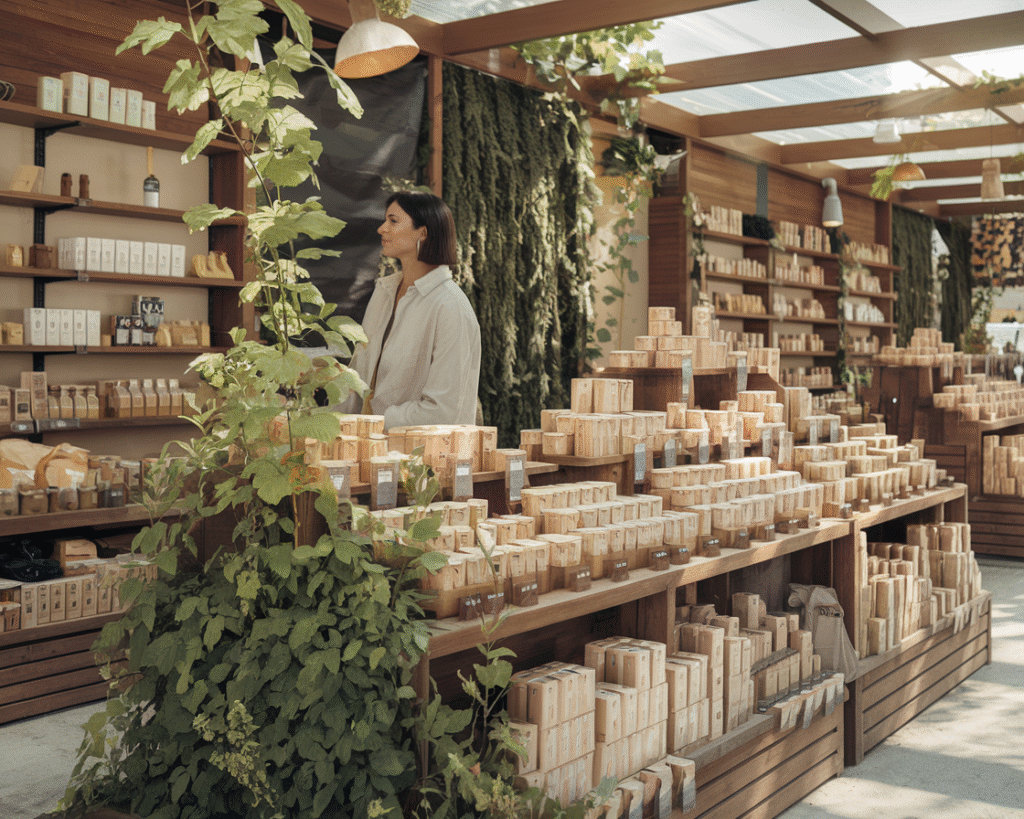Conscious Consumption: The New Standard for Modern Living

How mindful shopping can shift industries, reduce toxicity, and realign us with nature.
In an age defined by overproduction, environmental degradation, and endless consumer choice, a new kind of revolution is quietly taking root—one built not on protest or policy, but on intentional purchase decisions. It’s called conscious consumption, and it’s becoming the new standard for those seeking to live in alignment with their values, their health, and the Earth.
As awareness grows around the impacts of what we buy—on our bodies, communities, and ecosystems—so too does the desire to shop more mindfully. Conscious consumption asks us to pause before purchasing, to question how things are made, by whom, and with what cost to the planet. In doing so, it offers a powerful form of everyday activism.
What Is Conscious Consumption?
At its core, conscious consumption is the practice of making purchasing choices that reflect one’s ethical, environmental, and social values. It’s a move away from convenience-driven or impulse buying and toward intentionality—choosing products and services that do more good than harm.
This philosophy considers the full lifecycle of a product: where materials are sourced, how workers are treated, how it’s packaged, whether it’s recyclable or biodegradable, and how it ultimately affects both people and planet. Conscious consumers look beyond labels to ask deeper questions:
- Is this product sustainably sourced?
- Is the brand transparent and fair in its practices?
- Will this item benefit or burden my body, my home, and my environment?
Why It Matters Now More Than Ever
The urgency for conscious consumption is mounting. Today’s global supply chains are often built on systems that externalize costs—harming natural ecosystems, exploiting labor, and saturating our lives with synthetic materials and toxins. Fast fashion, plastic packaging, toxic skincare, and pesticide-laden foods have become the norm, not the exception.
But the consequences are visible and far-reaching:
- Microplastics in our oceans and even our bloodstreams.
- “Forever chemicals” (PFAS) in water, food, and household items.
- Climate change accelerated by carbon-heavy industries and irresponsible production.
- Soil depletion and biodiversity loss due to monoculture farming and chemical agriculture.
In light of these realities, conscious consumption becomes more than a lifestyle trend—it becomes a moral and ecological imperative.
The Power of Mindful Shopping
Every dollar spent is a vote for the kind of world we want to live in. When consumers collectively begin to prioritize ethical and sustainable products, the market responds. In recent years, we’ve already seen a marked shift:
- Growth in organic and regenerative agriculture.
- Expansion of eco-conscious beauty and personal care brands.
- Increased demand for plastic-free packaging and biodegradable alternatives.
- More visibility and support for small-batch, artisan, and fair-trade businesses.
Mindful shopping sends a clear signal: we are no longer willing to compromise health for convenience, ethics for price, or sustainability for speed.
Reducing Toxicity, Inside and Out
Many conventional products—especially in food, skincare, cleaning supplies, and textiles—contain hidden toxins that accumulate in our bodies and ecosystems over time. Conscious consumption actively seeks to eliminate exposure to these substances by choosing:
- Organic produce over pesticide-heavy options.
- Natural fibers and botanical dyes instead of synthetic textiles and chemical colorants.
- Non-toxic skincare free of parabens, phthalates, and artificial fragrances.
- Eco-friendly household items with minimal or compostable packaging.
By selecting goods that are free from harmful additives, conscious consumers not only protect themselves but also reduce the environmental burden of toxic waste and chemical runoff.
Realigning with Nature
At its heart, conscious consumption is not just about buying better—it’s about remembering our relationship with nature. In cultures around the world, consumption was once aligned with the natural world: seasonal, minimal, regenerative. Modern mass consumption, in contrast, is often extractive and disconnected.
Choosing to live consciously is a return to this ancient wisdom. It means asking:
- Does this support the Earth’s cycles or disrupt them?
- Is this regenerative or wasteful?
- Can I live with less, but better?
This mindset shift fosters a deeper appreciation for natural materials, local economies, and the long-term health of our ecosystems. It encourages us to treat the Earth not as a warehouse, but as a living home—worthy of care, restraint, and reciprocity.
Gaia Goods: Conscious Commerce in Action
At Gaia Goods, conscious consumption is more than a principle—it is the foundation of everything we do. Every product we offer is vetted not only for purity and performance but for its ability to exist in harmony with nature. From botanical formulations to biodegradable packaging, we believe that what we buy should heal, not harm.
We partner with small-scale herbalists, farmers, and makers who share our values—ensuring that every purchase supports ethical livelihoods, clean ecosystems, and genuine wellness. In this space, commerce becomes a tool for good, and every item tells a story of respect and reciprocity.
How to Begin Your Conscious Consumption Journey
Starting small can lead to lasting change. Consider these initial steps:
- Read labels and ingredient lists.
- Support local and independent businesses.
- Reduce impulse purchases; ask if you truly need the item.
- Buy less, but of higher quality and longer lifespan.
- Choose products with compostable, recyclable, or refillable packaging.
- Prioritize multipurpose items to cut down on clutter and waste.
Conclusion: A New Standard for Living
Conscious consumption is not about perfection—it’s about progress and presence. It’s about taking responsibility for what we bring into our lives and how those choices echo into the world around us. In a time when mass production has distanced us from source, meaning, and consequence, mindful shopping brings us back—to connection, integrity, and intentional living.
Let us choose not just with our wallets, but with our wisdom. In doing so, we don’t just change what we buy—we change what is made, how it’s made, and why it matters.
